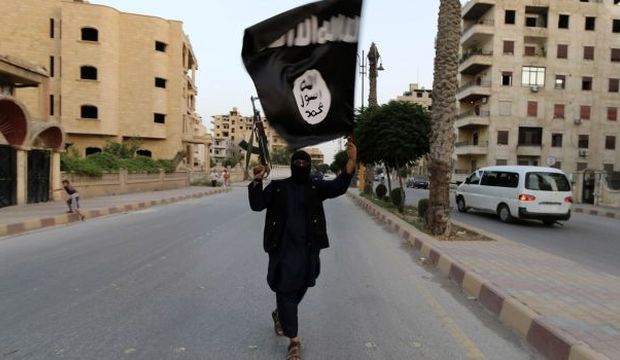
A member loyal to the Islamic State of Iraq and Syria (ISIS) waves an ISIS flag in the Syrian city of Raqqa, on June 29, 2014. (Reuters/Stringer)
Beirut, Asharq Al-Awsat—Lebanon’s justice minister has called for the “sternest punishments” to be applied to individuals who burned the flags of the militant groups the Islamic State of Iraq (ISIS) and the Al-Nusra Front in Beirut on Saturday, leading to widespread criticism from politicians and citizens alike.
The minister, Ashraf Rifi, issued a statement on Saturday in which he called on Lebanon’s state prosecutor to “bring to justice those individuals who burned the ISIS flag in Sassine Square [in Beirut] and inflict the sternest punishments upon them.”
He said this was because the flag had the Muslim Shahada (declaration of faith), “There is no god but God and Muhammad is his Prophet,” written on it, “which has nothing to do with ISIS and its terrorist approach,” and that burning it therefore constituted “an insult to the religious slogans of the Abrahamic faiths, and could stir up sectarian conflicts,” both of which are prohibited under Lebanese law.
Pictures of three boys burning the flags of ISIS and the Al-Nusra Front circulated on social media websites on Saturday. This burning was apparently in retaliation for the alleged recent beheading of a member of the Lebanese armed forces by ISIS, following clashes between militant groups and the Lebanese army on August 2, which also resulted in the capture of a number of Lebanese soldiers by ISIS and the Al-Nusra Front.
A number of Lebanese MPs criticized Rifi’s statement.
Ibrahim Kanaan, a member of the Change and Reform parliamentary bloc, came forward to say he will represent the three boys accused of burning the flags if a case against them makes it to court.
Nabil Naqoula, another Change and Reform member, dismissed Rifi’s response to the incident and asked him to retract his request to the state prosecutor. “The youths who burned the ISIS flag did not mean to insult the Islamic religion,” Naqoula said, adding that “this flag does not represent Islam in the slightest.”
For his part, Minister of Employment Sejaan Qazzi said of the incident: “What is needed is not the burning of the ISIS flag, but the burning of ISIS itself.”
Lebanese Foreign Minister Gebran Bassil, meanwhile, sent a message addressed to Rifi and Prime Minister Tammam Salam asking both to “be wary of sectarian conflict and from taking any decisions which could lead to it.”
He called on Lebanese Christians to “not confuse ISIS with Islam, nor the Prophet’s flag with that of ISIS, because Islam is the furthest thing possible from ISIS.”
Also echoing calls for calm, Lebanon’s Mufti of Tripoli and the North, Sheikh Malek Al-Sha’ar, dismissed the burning of the flags as an “isolated incident which did not have a political angle.”
In a statement on Saturday he said: “We ask everyone to allow the discourse of the head and the national interest to overpower the discourse of strong emotions and individual conflicts. Our nation is going through a critical period and we need our sons to be wary and for efforts to be made to get us out of this dark tunnel. We also ask everyone to leave these matters to the concerned officials and official and judicial institutions that resolve these kinds of matters within the framework of the law and national stability.”
Criticism of Rifi also filled social media websites, with many calling for the minister to resign or be sacked, and others calling for mass protests to burn the militant groups’ flags, using a hashtag in Arabic meaning “Burn it.”
One person, Ahmed Yassin, was surprised by Rifi’s attitude: “So burning the Hezbollah flag in Tripoli is fine, but burning the ISIS flag is a crime?” he asked.
Another, Emad Bezi, tweeted sarcastically: “Ashraf Rifi is asking for those who burned the ISIS flag to be brought to justice—since the embassy from [Abu Bakr] Baghdadi’s state [the “Caliphate” declared by ISIS in Iraq] might resent this, and this might cause a diplomatic crisis between us.”
“The minister, Ashraf Rifi, is incorrect in his assessment,” another, Salman Andary, tweeted. “ISIS, which slaughtered a member of the [Lebanese] army, must have its flag burned and its members executed. ISIS is outside Islam anyway.”

Trackbacks/Pingbacks